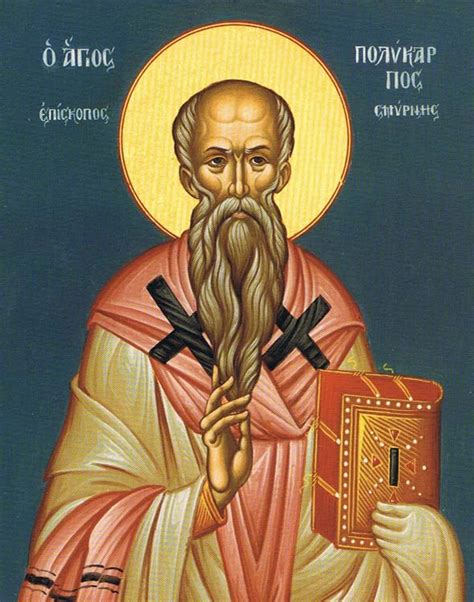
JANUARY 26 is the traditional memorial of ST. POLYCARP, BISHOP OF SMYRNA (+156).
Polycarp was a bishop in the city of Smyrna, an important trading city, across the Aegean Sea from Athens. But, before that, he was a follower of John. Since he was at least 86 years old when he died, he had to have been born at or before 70AD. John died around 99AD, the last of the Twelve to die. This means Polycarp would have known John well into his adult life.
According to Irenaeus, friend of Polycarp and later Bishop of Lyons, Polycarp was always teaching as John taught.
I can even describe the place where the blessed Polycarp used to sit and converse … his general way of life and personal appearance, even the lectures he delivered to the people. I remember how he would speak of his familiar interchange with John and with the rest of those who had seen the Lord. He would call their words to remembrance, anything he had heard from them concerning the Lord, both with regard to his miracles and his teaching. What Polycarp received from the eye-witnesses of the Word of life, he would recount in harmony with the Scriptures.
According to Irenaeus, both Polycarp and John were quite terse with heretics. There is a story about Polycarp meeting a well-known heretic named Marcion. The heretic asked Polycarp if he knew who he was. Polycarp’s response was: “I do know you. You’re the firstborn of satan”. John apparently treated other heretics the same. Polycarp must have learned this as the preferred mode of dealing with them.
It is known that Polycarp wrote extensively to both his own church members and a number churches that Paul had founded. Only the one to the church at Philippi still exists. In that letter, Polycarp exhorts the people to obey God and encourages them to stay holy and uphold the Faith.
The reasons we admire St. Polycarp today comes from two sources. St. Irenaeus’s writings show us Polycarp’s personality and spirituality. An anonymous writer watched the martyrdom of Polycarp and wrote it for all to read several years later. Polycarp’s conversation with the Pro-Counsel supported everything he had taught. It was a miraculous event: when the fire would not consume the body, the soldiers were ordered to stab him with a lance.
“We are unalterably resolved not to change from good to evil. It is only right to pass from evil to good.”
St. Polycarp to the Pro-Counsel

Recent Comments